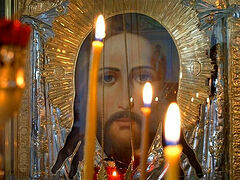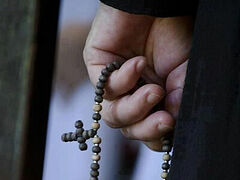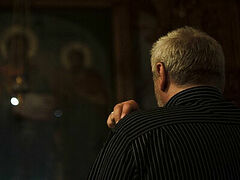Today we’re going to talk about a deep existential question that is of vital importance and has many dimensions in our lives. We’re going to talk about prayer. Prayer is the critically important meeting between our “I” and God.
Prayer is an encounter with God. It’s not just a question of sacred duty, not some kind of religious obligation, and even less is it something we do just to expel evil from ourselves and invoke good.
When I was young, my mother told me:
“Cross yourself so the Most Holy Theotokos will protect you, so you come home alive and well.”
This is good, a wonderful blessing, but this is not the essence of prayer. Prayer is not mentioning God at the most inopportune time. Who is He? When we go to sleep, when we’re tired, when our eyes are closing, when we’re sapped of our strength, that’s when most of us remember prayer. We have so many complaints against God—that He doesn’t hear us, that He has turned away from us, that He’s absent from our lives, but we only give him three or four minutes. We have to devote time to prayer. For prayer to become an encounter with the living God, we really have to devote enough time to it.
Prayer is a great encounter, because two great mysteries meet in it: God and the human heart, which, according to the Church Fathers, is an incredible and inexplicable mystery. We easily and recklessly blame people, discuss their behavior, draw conclusions about them, and accuse them. We think that we know everything about people, but in fact, we know nothing about them. The other person, even if it’s our neighbor, our husband, our wife, or our child, is one great stranger, because he or she is a great mystery to us. Why? Because each of them harbors a human heart within, and the depth of the human heart is unfathomable. That’s why we often find that we can live with someone for many years, but when something critical happens—illness, temptations in relationships, difficulties that shake us—it’s probably only then that we truly begin to realize who we’ve been living with all this time.
When does this usually happen? When we lose this person. In today’s Gospel, Christ says that in order to save your soul, first you must lose it (Mk. 8:35). This has a double interpretation. One is that in order to receive something, you have to sacrifice something. One of the main axioms that a mature man knows in his life is that you can’t have everything—only an immature man believes he can have it all. The main sign of a mature man is the understanding that he can’t have everything, but he tries to live well with what he has. This is the secret of a blessed life. Unhappiness begins when I get offended and protest about what I don’t have, and don’t praise God for what I do have. Our famous poet Elytis says, “I love those who take a rock and make a bird out of it.” There are so many people who have gone through hard times, through difficult periods in their lives, and possessing very few things, they have turned them into something very valuable in their hearts.
Let’s take a closer look at the three main stages by which you can achieve a state of prayer constituting a true encounter with the living God—not simply repeating some sacred but for you superficial words. Because no matter how sacred a word is, if it can’t transform your heart then it can’t give you anything.
The first is what the Holy Fathers and the Patericons say, that a Christian must not only pray. He must reach the state where his life becomes prayer. What does that mean? I can pray, read Compline, go to church, read canons at home, pray on my prayer rope, say the Jesus Prayer, but if I do it externally, no change occurs within me. I read the prayer rule that my spiritual father gave me, but I don’t truly pray, because I haven’t “connected” with God.
Prayer is a true encounter with God that has practical, not theoretical results. The goal is not simply to pray, but as the Holy Fathers say, to become prayer ourselves. In his letters, the great St. Theophan the Recluse wrote to monastics and his spiritual children: “Prayer is not standing before icons, but seeing God’s presence everywhere.” The great Elder Sophrony (Sakharov) from Essex in England, who we hope will soon be canonized by the Church,1 kept up a correspondence with his sister in Russia. She wrote to him once: “I’ve forgotten how to pray lately. I can’t pray and I feel unable to persist in prayer.” He replied to her, “Be careful, because it seems to me that what you’re telling me is happening because you perceive prayer as someone standing before icons and reading prayers.”
Prayers alone aren’t enough, hence they’re incomplete. I’m not saying they’re bad, but they’re not enough. Of course, a man begins with Compline, the Akathist to the Most Holy Theotokos, prayer canons, and he does all this at home with a prayer rope in his hands, but the point to doing all this is to unite with God, and with God’s grace to become a man who doesn’t merely say prayers, but becomes prayer himself. Perhaps you’re already asking yourself what that means. It means to see God’s presence everywhere, in everything and everyone, to sense the sacredness of God’s presence, the sacred sense of God’s presence; then everything can become a cause for doxology, prayers, and union with God. That’s what the saints did.
If you read the life of St. Porphyrios then you’ll see that he saw Christ in everything, that everything became an occasion for prayer for him, from the smallest and simplest blade of grass to the singing of a nightingale, and so on.
One evening, when St. Porphyrios was lying exhausted in the hospital and he had a terrible crisis that nearly killed him, what was there with him?
“A star,” he said, “was shining, and everyone saw it and said it was a sign of God’s presence.”
And that comforted him.
Elder Eumenios (Saridakis) is a great saint of our times, about whom St. Porphyrios said:
“There’s a secret saint. I want you to take me to him for Confession.”
He was a smiling, joyful, and warm-hearted man. When he was suffering from leprosy, the breeze would comfort and refresh him. Do you really see something strange in this, something “Hollywood?” These are simple things through which the saints felt the presence of God. They saw the presence and blessing of God in everyone and everything—in a man’s smile and his presence, in a friend, in a man who gives some brief response.
Fr. Nikolai (Sakharov), the nephew of Elder Sophrony and also a monk in Essex, says of the Elder that his entire life was not simply a prayer rule, as in a prayer rope and monastic prostrations, but his whole life was a prayer. His every movement was filled with prayer. He did nothing without prayer, or more precisely, he didn’t live without prayer. His life was prayer.
This is our great problem. We often divide the week and days and we say:
“Now it’s time for prayer! Then I’ll do something else. I’m going to go to church on Sunday. On Monday I have work and I should look different, because my job isn’t church…”
Thus we have a division and bifurcation in our lives. The surest way of understanding this is to ask your children. Ask them:
“My children, how do you see me at home? And how do you see me in church? Do I speak with your mother the same way I talk to the priest?”
But for our life to become prayer, in order to encounter the true, living God, we have to meet our true self. We’re strangers to ourselves. Think about how many masks we put on every day, how many roles we play every day. At work we’re in one role, at home another, with our wife a third, with our friends a fourth, and so on. We change and adapt to different roles depending on who we’re with. Therefore, authenticity is very important—something we’ve lost even in the Church. Before, if you went to a monastery, you would see all the spiritual charisms—one monk would be comforting another, another would be hard-working, another would have a practical mind, a fourth would have a contemplative mind. It used to be that you could see great prayerful monks, fasting monks, and cheerful monks in a monastery.
There was a priest in Athens, Fr. John the Joyful. I saw him in photos and heard his words, but I forget where he served. Perhaps some of you know him. Do you know why people gave him the nickname “Joyful?” The heart of every person who went to see him “boiled over” with joy. Fr. John took away their grief and grumbling. As Fr. Ananias Koustenis says, “If you make someone smile, the devil will burst with rage.” He also says that “a smile is mercy.” That is, charity isn’t just about giving someone money, but comforting his heart, relieving him of his pain, his problems, his fatigue as much as possible.
In other words, we’re not ourselves, and so it’s hard to understand the meaning of prayer when we begin to pray if we constantly deceive, if we don’t know who we are, if we don’t live our own life but rather live someone else’s life. We live the life our father , mother, or someone else wanted, but we don’t live our own life and we aren’t ourselves. And how will we encounter God if we’re inauthentic and don’t know who we are?
One young man said to me:
“Father, in the evening I watch movies, and then I go to pray. I read a bit from a book about Elder Paisios and I think I’m like him.”
This young man imagines himself as being like Elder Paisios, or Elder Porphyrios. The problem is that you’re not like them. Elder Paisios lived his life and found his path to God. And have you found your path to God? Therefore, there’s no greater mistake, no greater blasphemy against the Holy Spirit than the desire to copy someone else’s life. The mistake that often happens in Church circles is that we think that emulating the saints means copying their lives. No, you can’t do this, because as Elder Sophrony (Sakharov) says, you’ll look in vain for a repetition of the life of St. Nikodemos the Athonite or the life of St. Symeon the New Theologian in the life of another. Nothing will work out for you, because the Lord is a Person, and He creates a unique, personal, and inimitable relationship with every person.
The great Romanian ascetic Fr. Rafail Noica says, “Man is a path to God. Every man comes to God in his own way.” Because we’re inimitable, unique. And the Lord is looking for an encounter with us, not with someone else, not with our imaginary self.








